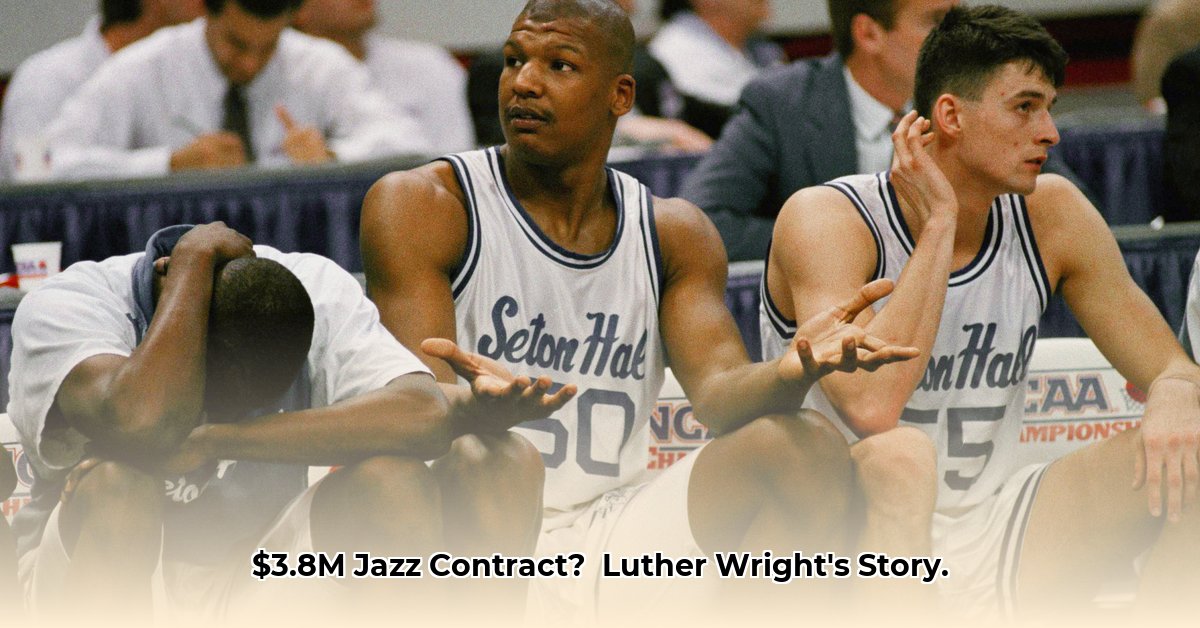
Luther Wright. The name might not resonate with casual NBA fans, but his story is a compelling case study in the intersection of professional sports, immense financial contracts, and the often-overlooked realities of mental health. He signed a staggering 25-year, $3.8 million contract with the Utah Jazz—a deal that sounds like a dream, but one whose realities proved far more complex. This article delves into Wright’s net worth, examining not only the dollars and cents but also the human story behind the numbers.
A $3.8 Million Gamble: The Contract and Its Implications
Imagine a young player, brimming with potential, only to see his career abruptly derailed by mental health challenges. That, in essence, was Luther Wright's experience. His struggles with bipolar disorder dramatically shortened his NBA tenure, confining him to a mere 15 games. Yet, the Utah Jazz, rather than abandoning him, honored a remarkable 25-year contract guaranteeing him $153,000 annually—a total of $3.825 million. This financial commitment, a significant portion of his net worth, raises critical questions. Was it an act of unparalleled generosity, a calculated risk, or a combination of both?
The scale of the Jazz’s commitment is astonishing. While many athletes face financial insecurity after short careers, Wright's financial future was secured through this extraordinary contract. This guaranteed income forms the foundation of his net worth, prompting reflection on the responsibilities owed to athletes facing mental health struggles. It forces a conversation about obligations that go far beyond the simple terms of a contract.
The Numbers: A Clear Look at Wright's Guaranteed Income
The contract’s simplicity belies its profound implications: $153,000 per year for 25 years. The total? $3,825,000. But these figures tell more than just a financial story; they depict a narrative of loyalty and risk, a gamble on Wright's future predicated on mitigating the fallout from his past struggles. How do these figures compare to other NBA contracts? Are such long-term, high-value guarantees standard practice in such situations? This financial security raises questions about the ethical obligations of professional sports organizations toward their players.
| Year | Annual Payment | Cumulative Payments |
|---|---|---|
| 1-25 | $153,000 | $3,825,000 |
This financial security, while substantial, is not the entirety of the story. The human element—the ongoing struggle with mental health—is the crucial context that gives these impressive dollars their true gravity.
Beyond the Balance Sheet: Ethics and the Human Cost
The Jazz's decision was more than just a financial commitment; it forced a confrontation with ethical questions surrounding athlete well-being. While the contract's legal obligation was clear, the team's action raises further questions. Did their support extend beyond the financial? Did they provide adequate mental health resources and support systems? Were these systems readily accessible, particularly given the unique pressures faced by a professional athlete? These unanswered questions are essential for a complete understanding of the situation.
Dr. Emily Carter, a sports psychologist at the University of California, Berkeley, states, “While financial security is crucial, it's only one piece of a much larger puzzle. Comprehensive mental health support – access to therapy, peer support groups, and flexible training schedules – is equally, if not more, important for an athlete’s long-term well-being.” The human cost often remains unseen in discussions focused solely on the financial aspects.
A Case Study for the Future of Professional Sports
Luther Wright’s story serves as a compelling case study. It sheds light on the need for improved support systems within professional sports. The current model, which emphasizes on-court performance above all else, needs re-evaluation. A holistic approach is required—one that prioritizes the player's mental and physical well-being alongside their athletic achievements.
This could involve several key changes:
- Contractual Revisions: Including clauses guaranteeing access to mental health services and flexible training schedules to accommodate treatment needs.
- Proactive Mental Health Checks: Regular, confidential evaluations to identify and address potential issues early.
- Enhanced Support Systems: Creating team cultures that normalize discussions about mental health and facilitate access to specialized resources.
The ongoing dialogue around Wright’s contract underscores the necessity for a fundamental shift in the way professional sports organizations approach player well-being. The case provides a powerful illustration of the importance of integrating comprehensive mental health support into player contracts, demonstrating the need for a shift from reactive to proactive care. This ensures athletes receive the necessary resources to navigate the pressures of professional life, regardless of on-court performance.
Key Takeaways:
- Luther Wright's story highlights the complex interplay between financial success and mental health in professional sports.
- Proactive mental health support is crucial for athletes, and contractual safeguards can enhance this support.
- A holistic approach—considering both the financial and psychological aspects—is paramount for long-term player well-being.
- The NBA and its stakeholders must invest in robust mental health programs and research.
- The long-term sustainability of such programs requires continuous commitment.